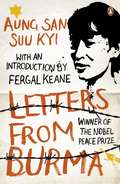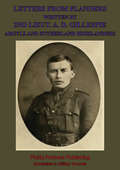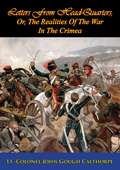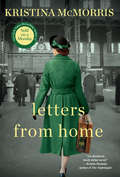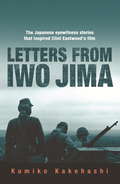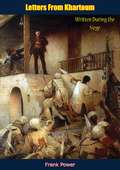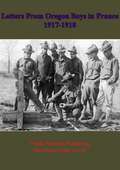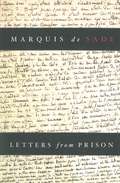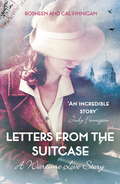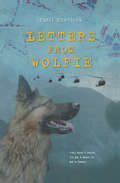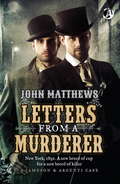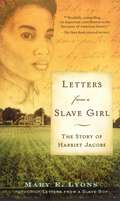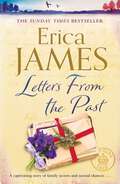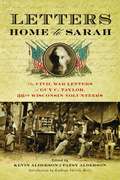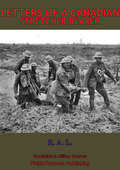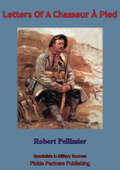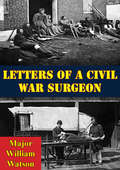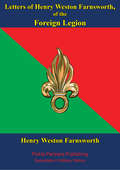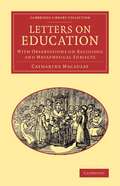- Table View
- List View
Letters From Burma
by Aung San Suu KyiLetters from Burma - an unforgettable collection from the Nobel Peace prize winner Aung San Suu KyiIn these astonishing letters, Aung San Suu Kyi reaches out beyond Burma's borders to paint for her readers a vivid and poignant picture of her native land.Here she celebrates the courageous army officers, academics, actors and everyday people who have supported the National League for Democracy, often at great risk to their own lives. She reveals the impact of political decisions on the people of Burma, from the terrible cost to the children of imprisoned dissidents - allowed to see their parents for only fifteen minutes every fortnight - to the effect of inflation on the national diet and of state repression on traditions of hospitality. She also evokes the beauty of the country's seasons and scenery, customs and festivities that remain so close to her heart.Through these remarkable letters, the reader catches a glimpse of exactly what is at stake as Suu Kyi fights on for freedom in Burma, and of the love for her homeland that sustains her non-violent battle.Includes an introduction from Fergal Keane'Aung San Suu Kyi has become a global symbol of peaceful resistance, courage and apparently endless endurance' Guardian'A real hero in an age of phony phone-in celebrity, which hands out that title freely to the most spoiled and underqualified' Bono, TimeAung San Suu Kyi is the leader of Burma's National League for Democracy. She was placed under house arrest in Rangoon in 1989, where she remained for almost 15 of the 21 years until her release in 2010, becoming one of the world's most prominent political prisoners. She is also the author of the collection of writings Freedom from Fear.
Letters From Flanders Written By 2nd Lieut. A. D. Gillespie, Argyll And Sutherland Highlanders
by Lieutenant Alexander Douglas GillespieThe sight of the kilted Highland regiment has always struck such fear into their Germans opponents of both World Wars; known to their Teutonic foes as the "Ladies from Hell" for their attire and fighting prowess. The memories of those brave Celtic Warriors fighting across the mud of Flanders remains in the swirl of the bagpipe laments, faded pictures and memoirs from their ranks. The letters of two brothers Alexander and Thomas Gillespie still do survive, from the lowlands of Scotland, volunteered to serve in the British Army almost as soon as the war broke out leaving behind a career in law and academia respectively. They did not long have to wait to be thrown into the holocaust of the front lines; Tom was posted to the King's Own Scottish Borderers and was immediately under the shellfire of the battle of the Marne and the Race to the sea before he was killed in action on October 18 1914 near La Bassée. Despite his brother's ultimate sacrifice Alexander went forward to the front in February 1915 with the 2nd Battalion of the Argyll and Sutherland Highlanders. He led his men forward, as part of the first wave of the great push of the 19th Brigade on Cambrin Road, into the horrific shellfire and gas at the opening of the battle of Loos on the 25th September 1915. He was the only officer that made it to the German position that was their objective, but there he fell beneath the German fire.A fine set of letters from the front lines of Flanders by two Scottish officers.
Letters From Head-Quarters: Or, The Realities Of The War In The Crimea [Illustrated Edition]
by Lt.-Colonel John Gough CalthorpeIllustrated with over two hundred and sixty maps, photos and portraits, of the battles, individuals and places involved in the Crimean War.In this fascinating volume of letters and memoirs, the history of the Crimean War is full brought to life by Lt.-Col. Calthorpe.Lt.-Col. Calthorpe, later 7th baron Calthorpe (1831-1912), edited and initially published these letters anonymously that he had sent to friends from the Crimea, where he served as aide-de-camp to his uncle, Lord Raglan, whose reputation he stoutly defended. The letters run from 18 September 1854 until 30 June 1855 when, following Raglan's death on 28 June, Calthorpe returned to Britain. In addition to the detailed account of military actions, Calthorpe mentions his participation in a decoy mission by ship to Yalta in late May 1855 and recalls a pleasure trip he had made to the southern Crimean coast in the summer of 1851.
Letters From Home
by Kristina McMorrisThree young women embark on adventures of the heart during WWII in this sweeping romance by the New York Times bestselling author of Sold on a Monday. Chicago, 1944. Set to marry her childhood sweetheart, Liz Stephens has no interest in attending the USO club dance. But her friends Betty and Julia insist on bringing her along—and Liz gets a glimpse of Morgan McClain. Even though their brief exchange is cut short by the soldier's evident interest in Betty, Liz can't forget him. So when Betty asks her to ghostwrite a letter to Morgan, stationed overseas, Liz reluctantly agrees. Thousands of miles away, Morgan struggles to adjust to the brutality of war. His letters from "Betty" are a comfort, and they begin a soul-baring correspondence. While Liz is torn by her feelings for a man who doesn't know her true identity, Betty and Julia each become immersed in their own romantic entanglements. And as the war draws to a close, all three will face heart-wrenching choices, painful losses, and the bittersweet joy of new beginnings. Beautifully rendered and deeply moving, Letters from Home is a story of hope and connection, of sacrifices made in love and war—and the chance encounters that change us forever.
Letters From Iwo Jima: The Japanese Eyewitness Stories That Inspired Clint Eastwood's Film
by Kumiko KakehashiLetters from Iwo Jima reveals the true story of the Battle of Iwo Jima, the subject of two films directed by Clint Eastwood. Flags of Our Fathers tells the story of the US Marines who raised the flag above the island: the iconic image of the war with Japan. His other film, Letters from Iwo Jima, tells the story from the Japanese point of view. At the heart of the story is the maverick general Tadamichi Kuriyabashi, devoted family man, brilliant leader and the first man on the island to know they were all going to die.As Clint Eastwood comments, 'General Kuribayashi was a unique guy. He liked America. He thought it was a mistake to go to war . . . America was too big an industrial complex.' Unlike most Japanese officers, he had travelled abroad, spent time in America and was under no illusions as to the ultimate end. He fought and died to delay the Americans for as long as he could. He knew that once the island fell, it would be used as an airbase by US bombers to strike at Tokyo. His unorthodox methods made this the fiercest battle the US Marines have ever faced, and he sustained resistance far longer than anyone believed possible.Kumiko Kakehashi's heart-rending account is based on the letters written home by the doomed soldiers on the island, mostly family men, conscripted late in the war. She reveals a very different Japanese army from the popular image. It is an incredibly moving portrayal of men determined to resist to the last breath, despite their profound opposition to the regime that led them into war.
Letters From Katrina: Stories Of Hope And Inspiration
by Mark Hoog Kim LemaireThis project began in the spring of 2005 when students in one elementary classroom in Colorado were asked to participate in a unique book drive for the children along the gulf coast. Each Colorado student was given a new Growing Field children's picture book and, inside of it, invited to write a letter to a student along the gulf coast affected by Hurricane Katrina. The result, which includes schools, classrooms and students from California to Virginia, has been magical. In searching their heart and mind for meaningful words to write. . . the children found their own voice of value and a way to make their own special contribution. Through their words of hope, inspiration and friendship they have reached out to inspire their friends throughout Mississippi to believe that life is still without limit. The letters written by our next greatest generation are profiled in this new book and will soon be available for you to purchase. This elegant coffee table book illustrates the difference each of us makes when reaching out to others in need. The letters written by elementary students serve as a powerful reminder that the world can be changed when we ask not about gender, race, religion or socio-economic status but instead share with others six magical words that will truly change the world. . . I hope we can be friends. 100% of the proceeds from the sale of this book will be placed in an endowment that will create a lifetime of scholarships and opportunity for children throughout Mississippi and the Gulf Coast.
Letters From Khartoum: Written During the Siege
by Frank PowerIt was in May, 1883, that Edmund Dwyer Gray, the chairman of the Freeman’s Journal, conceived the idea of making his paper a pioneer in providing its readers with foreign news. The Soudan, as it was then known, was in a state of wild unrest. The Mahdi’s followers had revolted, and British troops in and around Khartoum were having a bad time. The years 1884 and ‘85 were fraught with gravest apprehensions for their safety.No American or English journals had correspondents in any part of North Africa, and since a brief message had come through to London announcing the destruction of Col. William Hicks’ Army—annihilated on its way to attack the Mahdi’s headquarters—nothing had been learned of subsequent events. It was then that Mr. Gray seized the occasion, and made the Dublin Freeman’s Journal one of the most frequently-quoted publications of our time.The man he chose, Mr. Frank Power, known to his colleagues in Dublin’s Prince’s street as “Ghazi” Power, was the most dare-devil, resourceful and versatile member of his staff, equal to any emergency and avid for the ordeal that would try his mettle. His employer handed him a blank cheque, and told him to make all speed from Gravesend to Cairo, and, by hook or crook, to penetrate into Khartoum and dispatch all that he could gather about the state of affairs there and in the country around.The Government replies that followed were based on Freeman’s Journal despatches or telegrams to Whitehall, and all revealed the growing gravity of the situation. Before many weeks of 1885 had expired the tragic news came from Mr. Power that General Gordon and several of his staff had been butchered in January by the Mahdi’s mercenaries.Mr. Power’s letters brought the story of the siege down to July 31st, 1884, and the present volume consisting of Power’s letters to his family describing the siege of Khartoum was first published the following year.
Letters From Oregon Boys in France 1917-1918
by VariousAs the military and industrial might of the United States turned to enter the First World War, boys and men from all of America enlisted, volunteered and were drafted into the armed forces. As a small microcosm of the millions that served, these 45 letters from the Front offer an insight into the fighting men. The collection of letters is as varied as the men that wrote them, ranging from Railway engineers, to naval officers, to ordinary soldiers at the front. A Flavour of the American war effort in the First World War.Text taken, whole and complete, from the edition published in Portland, Glass and Prudhomme, 1917-18Original Page Count - 128 pages.
Letters From Prison
by Richard Seaver Marquis De SadeThe 1990s have seen a resurgence of interest in the Marquis de Sade, with several biographies competing to put their version of his life story before the public. But Sadean scholar Richard Seaver takes us directly to the source, translating Sade's prison correspondence. Seaver's translations retain the aristocratic hauteur of Sade's prose, which still possesses a clarity that any reader can appreciate. "When will my horrible situation cease?" he wrote to his wife shortly after his incarceration began in 1777. "When in God's name will I be let out of the tomb where I have been buried alive? There is nothing to equal the horror of my fate!" But he was never reduced to pleading for long, and not always so solicitous of his wife's feelings; a few years later, he would write, "This morning I received a fat letter from you that seemed endless. Please, I beg of you, don't go on at such length: do you believe that I have nothing better to do than to read your endless repetitions?" For those interested in learning about the man responsible for some of the most infamous philosophical fiction in history, Letters from Prison is an indispensable collection.
Letters From The Suitcase
by Cal Finnigan Rosheen FinniganTHE LETTERS FROM THE SUITCASE by Rosheen and Cal Finnigan reveals the detailed and poignant wartime romance between David and Mary Francis. For readers of Sheila Hancock's MISS CARTER'S WAR or Helen Simonson's MAJOR PETTIGREW'S LAST STAND 'I still have that recurring fear of something happening to me before I see you again, and before I can tell you myself just how much and how often I've realised during the last few months that I love you completely and to the exclusion of all others. Remember that, because if there wasn't you, my darling Mary, the world would seem very empty and meaningless.'Mary and David Francis were only twenty-one and nineteen when they met in 1938. They fell in love instantly, and against the wishes of David's parents, they lived together and married, in secret. These poignant letters reveal their intelligence and thoughtfulness, their passion, the everyday details of their lives working as a secretary at Bletchley Park and as a young officer in action on the other side of the world, and Mary's experience of bringing up a small baby alone in London. David was to die in India, five years after their first encounter, though his letters continued to reach Mary long after the event. At heart, this is the story of a young couple who were utterly devoted to one another. It is also the story of a father that Rosheen Finnigan never knew but came to love.
Letters From The Suitcase
by Cal Finnigan Rosheen FinniganTHE LETTERS FROM THE SUITCASE by Rosheen and Cal Finnigan reveals the detailed and poignant wartime romance between David and Mary Francis. For readers of Sheila Hancock's MISS CARTER'S WAR or Helen Simonson's MAJOR PETTIGREW'S LAST STAND 'I still have that recurring fear of something happening to me before I see you again, and before I can tell you myself just how much and how often I've realised during the last few months that I love you completely and to the exclusion of all others. Remember that, because if there wasn't you, my darling Mary, the world would seem very empty and meaningless.'Mary and David Francis were only twenty-one and nineteen when they met in 1938. They fell in love instantly, and against the wishes of David's parents, they lived together and married, in secret. These poignant letters reveal their intelligence and thoughtfulness, their passion, the everyday details of their lives working as a secretary at Bletchley Park and as a young officer in action on the other side of the world, and Mary's experience of bringing up a small baby alone in London. David was to die in India, five years after their first encounter, though his letters continued to reach Mary long after the event. At heart, this is the story of a young couple who were utterly devoted to one another. It is also the story of a father that Rosheen Finnigan never knew but came to love.
Letters From The Suitcase
by Cal Finnigan Rosheen FinniganTHE LETTERS FROM THE SUITCASE reveals the vivid, poignant and hugely detailed wartime correspondence between David and Mary Francis from 1938 to 1943, and a unique love story, sure to appeal to readers of Roald Dahl's LOVE FROM BOY, Sheila Hancock's MISS CARTER'S WAR or Helen Simonson's MAJOR PETTIGREW'S LAST STAND 'I still have that recurring fear of something happening to me before I see you again, and before I can tell you myself just how much and how often I've realised during the last few months that I love you completely and to the exclusion of all others. Remember that, because if there wasn't you, my darling Mary, the world would seem very empty and meaningless.'Mary was only 21 when she met and fell in love with the privately educated 19 year old David in 1938. Their affair was passionate, and in a swing of disgust at their class divide, and the growing rise of fascism and the Nazi party in Europe, they joined the Communist Party. These letters reveal their intelligence and thoughtfulness, details of their lives working as a secretary at Bletchley Park and as a young officer in action on the other side of the world, their marriage against the wishes of David's parents, their sexual desire and longing, and Mary's experience of bringing up a small baby alone. David was to die in India, five years after their meeting, though his letters continued to reach Mary long after the event. At the heart, this is the story of a short but rich, rewarding and colourful love, written with vivacity and honesty. It is also the story of a father that Rosheen Finnigan never knew, and a fascinating social history, utterly unique in the telling.(P)2017 Headline Publishing Group Limited
Letters From Wolfie
by Patti SherlockIt's 1969 and America is deeply divided over the war in Vietnam. Yet when thirteen-year-old Mark donates his dog, Wolfie, to the Army's scout program, he feels sure he's doing the right thing. After all, his dad is a WWII veteran, and his older brother Danny is serving in Vietnam. But although Wolfie's handler sends letters detailing Wolfie's progress, the Army won't say when or if Wolfie and the other dogs will be returned to their owners. As Danny's letters home become increasingly grim, Mark grows more and more unsure of his decision to send Wolfie, and of his feelings about the war. He'll need to do something drastic to get Wolfie back, but how can he raise his voice in protest without betraying his country? Inspired by real events, this is a gripping story about loyalty, dissent, patriotism, and the heartbreaking contradictions of war.
Letters From a Murderer
by John MathewsNew York, 1891: a rapidly changing city, torn between lamplight and electric light, where the burgeoning steel and railway industries attract a flood of humanity from every corner of the globe, fuelling cut-throat gangs, corruption and vice.A prostitute is found brutally murdered. Immediately fear starts to spread. The victim bears the same hallmarks as Jack the Ripper's recent killing spree in England. Could it be that the Ripper has crossed the Atlantic to fresh killing grounds? Or is this simply a copycat murder?To solve the case, one of the original English Ripper pathologists, Finley Jameson, is teamed up with Joseph Argenti, one of the new 'untouchable' detectives, hand-picked by a New York Mayor eager to fight corruption.But Michael Tierney, the city's leading gangster, has his own ideas about how the city should be run. And as the body-count rises, and Jameson & Argenti are taunted by the killer in open letters, they find themselves fighting not just to save the next victim, but for the city's very soul.
Letters From a Slave Girl: The Story of Harriet Jacobs
by Mary E. LyonsBased on the true story of Harriet Ann Jacobs, Letters from a Slave Girl reveals in poignant detail what thousands of African American women had to endure not long ago, sure to enlighten, anger, and never be forgotten.Harriet Jacobs was born into slavery; it's the only life she has ever known. Now, with the death of her mistress, there is a chance she will be given her freedom, and for the first time Harriet feels hopeful. But hoping can be dangerous, because disappointment is devastating. Harriet has one last hope, though: escape to the North. And as she faces numerous ordeals, this hope gives her the strength she needs to survive.
Letters From the Past: The bestselling family drama of secrets and second chances
by Erica JamesThe captivating new drama of family secrets and second chances, from Sunday Times bestselling author Erica James Suffolk, 1962. The Devereux family are gathering for a party, and a series of anonymous letters are about to turn the sleepy village of Melstead St Mary upside down . . .Evelyn is preparing to celebrate her 20th wedding anniversary, but there are secrets she's never told her beloved husband, Kit. Secrets that stretch back to her wartime days at Bletchley Park . . . For Hope, her sister-in-law, happiness has never come easily, and the letter she receives could destroy her fragile world. While, up at Melstead Hall, Julia has discovered that life she married into comes at a heavy price. And halfway across the world, the indomitable Romily is longing for home. But with the Devereux family under threat, she finds herself confronting her own closely guarded secret. Can she save the day, and seize her own chance of happiness? From the gorgeous Suffolk countryside to the sun-baked desert of Palm Springs, let Erica James sweep you away...
Letters From the Past: The bestselling family drama of secrets and second chances
by Erica JamesThe captivating new drama of family secrets and second chances, from Sunday Times bestselling author Erica James Suffolk, 1962. The Devereux family are gathering for a party, and a series of anonymous letters are about to turn the sleepy village of Melstead St Mary upside down . . .Evelyn is preparing to celebrate her 20th wedding anniversary, but there are secrets she's never told her beloved husband, Kit. Secrets that stretch back to her wartime days at Bletchley Park . . . For Hope, her sister-in-law, happiness has never come easily, and the letter she receives could destroy her fragile world. While, up at Melstead Hall, Julia has discovered that life she married into comes at a heavy price. And halfway across the world, the indomitable Romily is longing for home. But with the Devereux family under threat, she finds herself confronting her own closely guarded secret. Can she save the day, and seize her own chance of happiness? From the gorgeous Suffolk countryside to the sun-baked desert of Palm Springs, let Erica James sweep you away...
Letters From the Sky (David and Andrew #2)
by Tamer LorikaJeanne is now in her eighth year of school, and never has the world seemed more strange. Her little town grows greyer and greyer, and every day the radio tells news of a war just far enough away, it doesn’t matter to her.Yet.What does matter are immediate things: her friends, her family, and a magical guardian named Jericho who visits while she sleeps. Jericho’s love for her seems so perfect as to be impossible. But when Jericho disappears for weeks at a time, Jeanne isn’t sure she can continue to believe her guardian is real any longer.As Jeanne’s relationship with Jericho deepens, can she continue to believe in her guardian? Can Jericho’s love protect her in the midst of impending war? Or does Jericho even exist at all?
Letters Home to Sarah
by Guy C. TaylorForgotten for more than a century in an old cardboard box, these are the letters of Guy Carlton Taylor, a farmer who served in the Thirty-Sixth Wisconsin Volunteer Infantry Regiment in the American Civil War. From March 23, 1864, to July 14, 1865, Taylor wrote 165 letters home to his wife Sarah and their son Charley. From the initial mustering and training of his regiment at Camp Randall in Wisconsin, through the siege of Petersburg in Virginia, General Lee's surrender at Appomattox, and the postwar Grand Review of the Armies parade in Washington, D. C. , Taylor conveys in vivid detail his own experiences and emotions and shows himself a keen observer of all that is passing around him. While at war, he contracts measles, pneumonia, and malaria, and he writes about the hospitals, treatments, and sanitary conditions that he and his comrades endured during the war. Amidst the descriptions of soldiering, Taylor's letters to Sarah are threaded with the concerns of a young married couple separated by war but still coping together with childrearing and financial matters. The letters show, too, Taylor's transformation from a lonely and somewhat disgruntled infantryman to a thoughtful commentator on the greater ideals of the war. This remarkable trove of letters, which had been left in the attic of Taylor's former home in Cashton, Wisconsin, was discovered by local historian Kevin Alderson at a household auction. Recognizing them for the treasure they are, Alderson bought the letters and, aided by his wife Patsy, painstakingly transcribed the letters and researched Taylor's story in Wisconsin and at historical sites of the Civil War. The Aldersons' preface and notes are augmented by an introduction by Civil War historian Kathryn Shively Meier, and the book includes photographs, maps, and illustrations related to Guy Taylor's life and letters.
Letters Of A Canadian Stretcher Bearer
by Anna Chapin Ray Anon - R.A.L.The witty, bitter and caustic memoirs of an anonymous Canadian stretcher-bearer who served during some of the fiercest fighting on the Western Front in 1916 and 1917 before being invalided back to his native land."FOR military reasons, it has been judged wiser to withhold the full name of the Canadian Stretcher Bearer until the close of the war."However, it may interest his readers to know that he is an Old Country-man, although he is now in the Canadian Expeditionary Force, and earlier had lived in the States. On the 31st May, 1915, he enlisted. Six weeks later, with the earliest of our letters, we find him in England, and rebelling against the unsatisfactory nature of service in what he caustically terms a Safety-First battalion. It was only a matter of time, however, before he caused himself to be transferred to hospital service, crossing to France to take a place as orderly in No. 3 Canadian General Hospital at Boulogne, where he arrived early in 1916. From that time on until the 23rd August, 1917, when he was gassed and sent to Blighty, the story has been left entirely in his own hands, to tell it as convincingly as may be."Since then, he has been, first in hospital in England, then in the First Reserve Battalion, awaiting the call back to service in the trenches."This call, however, is sounding fainter and more remote. A cable has been received, this morning, saying that he is being sent back to Canada, his active service at an end." OTTAWA, Fifth December, 1917
Letters Of A Chasseur À Pied: Letters From A Chasseur À Pied (Williams-ford Texas A&m University Military History Ser. #83)
by Anon Sergeant Robert PellissierThe amazing story of a French American teacher who left his life at Stanford college to volunteer for the French Army, in the elite chasseurs-à-pied, during the First World War.Although born in France Robert Pellissier in 1882, he moved to America in 1882 to live with his sister. A gifted scholar of ardent professionalism, he studied at Harvard and taught at Williston College and Stanford. However when war broke out in Europe his morals would not allow him to sit idly by whilst France was invaded and European civilisation was under assault. He wrote home obsessively, to his parents, his fiancée and his colleagues describing with great passion the fight for justice that he had embarked on. Filling with wry humour, contemporary political commentary, and most often an sense of the insanity of war. For example, with bitter irony, he quotes the idiocy of an the outdated war manual he had been given in one of his letters-'Any disengaged body of troops should right away march to the firing line'- a death sentence in the trenches!In late 1914 he was posted to the inhospitable mountainous region in the north of France the Vosges, after an abortive offensive earlier the year the French only held the rocky outcrops out of all of the Alsace region. But Pellissier and his comrades would cling on to their foothold tenaciously for national honour; he was wounded and invalided out of the frontline in 1915. He was promoted to become an sergeant in 1916, he returned to the front in time to be engaged in the brutal fighting during the battle of Hartmannweilerskopf where he and his men fought on for 53 days without relief, which could not be effected due to the heavy German bombardment. It was during the battle of the Somme in 1916 that Sergeant Pellissier eventually met his end, at least on the soil of his beloved France.
Letters Of A Civil War Surgeon
by Major William Watson Prof. Paul Fatout"From September 1862 until May 1865, Major William Watson served as surgeon with the 105th Regiment of Pennsylvania Volunteers, which fought at Fredericksburg, Chancellorsville, Gettysburg, the Wilderness, and elsewhere. Over the course of three years at war, he wrote 91 letters to his family, in which he describes his own war against death and disease. This well-educated and sensitive young man has left us a variety of impressions of camp life, marches, and battles; of a soldier's matter-of-fact willingness to accept-though not without grumbling-the rigors of his lot, of concern with the job at hand and with immediate needs like food and shelter; and of a veteran's indifference to the flag-waving of professional patriots. In spite of his often acute criticisms of the Union's military leadership, Watson never faltered in his belief in the Union cause and the ultimate outcome of the war nor in his dedication to Lincoln's major goals."-Print ed.
Letters Of Henry Weston Farnsworth, Of The Foreign Legion
by Henry Weston FarnsworthThe French Army have had numerous foreign regiments in its service for centuries; however, few have the mystique and elite status of the French Foreign Legion. It became a haven for the rough, tough, and adventure-seeking crowds of all of Europe. Bred with a fierce and disciplined esprit de corps, these soldiers could expect to fight France's enemies even in the most desperate of circumstances.With the clouds of war gathering over Europe in the early years of the Twentieth Century, the Legion attracted volunteers from even further afield, including the wealthy American adventurer and traveller Henry Weston Farnsworth. He volunteered for service early in late 1914 and was thrown together with a diverse bunch of men from a number of countries, some of whom he would bond with closely. His pen portraits in his letters to his family are filled with these characters and the experiences he had in the front-lines. However, Farnsworth would fight among his new friends for only a few months as the fighting in France grew ever more fierce and his unit was thrown into the battles in Champagne during which he died.
Letters Of The Century: America 1900-1999
by Lisa Grunwald Stephen J. AdlerMore than 400 letters from famous people and regular citizens giving voice to events throughout the century.
Letters On Education: With Observations On Religious And Metaphysical Subjects (Cambridge Library Collection)
by Catharine MacaulayFirst published in 1790, this collection of letters presents the mature views of Catharine Macaulay (1731-91) on education and related topics. Famed as an impassioned writer on history and politics, she defied eighteenth-century preconceptions of what it was possible and appropriate for women to achieve. Ranging across a broad spectrum of subjects, from diet and reading to pastimes, religion and discipline, this work reflects her enlightened thinking. She compares the educational situation in England to the contemporary French and American systems, and even those of ancient Rome and Sparta. Championing equality in education regardless of gender, Macaulay argues for the instruction of girls within a co-educational system, seeing this as the only way to improve female standing in society. Also reissued in this series is her eight-volume History of England (1763-83), which traces the upheavals of the seventeenth century.
